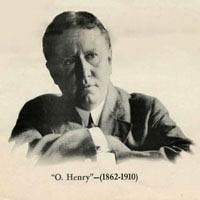Curly the tramp sidled toward the
free-lunch counter. He caught a fleeting glance from the bartender's eye, and
stood still, trying to look like a business man who had just dined at the
Menger and was waiting for a friend who had promised to pick him up in his
motor car. Curly's histrionic powers were equal to the impersonation; but his
make-up was wanting. The bartender rounded the bar in a casual way, looking up
at the ceiling as though he was pondering some intricate problem of
kalsomining, and then fell upon Curly so suddenly that the roadster had no
excuses ready. Irresistibly, but so composedly that it seemed almost absendmindedness
on his part, the dispenser of drinks pushed Curly to the swinging doors and
kicked him out, with a nonchalance that almost amounted to sadness. That was
the way of the Southwest.
Another in the 100 Best Roster. The offered paragraph
reveals a light raconteuring tone but…not offered are the stretches of dialogue
rendered in dialect.
I must admit, dialect passages seldom work for me—rather
than draw me in, I am pushed away.
I am puzzled by this stab at rendering language “authentic.”
We accept novels and poetry in translation that we may
better appreciate the inherent charms, where dialect in the native language seems
to provide a chore or hurdle that the reader must overcome to get at what the
author intends.
The dialect hurdle and a pat coincidence ending make
this one a puzzle for 100 Best inclusion, to this reader.
If you have no such dialect prejudice, you may find
charms that elude me.
Good on you!





No comments:
Post a Comment
Note: Only a member of this blog may post a comment.